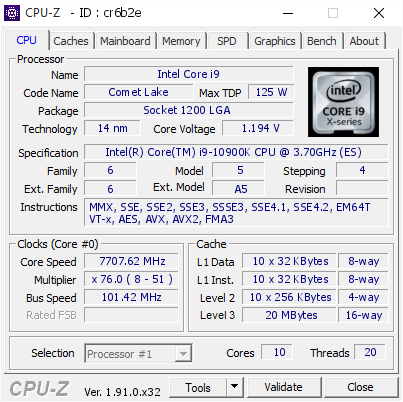Intel Core i9-10900K + Liquid Helium = 7.707 GHz Record
Intel only launched its blazing hot Intel Core i9-10900K yesterday, and we already have a world overclocking record: 7.707 GHz, as recorded on HWBot Wednesday. Since it's so early in the chip's release, chances are we'll see the chip hit even higher speeds in the foreseeable future, but 7.7 GHz on all CPU cores is still a seriously impressive figure.

The overclock was accomplished by an overclocker known Elmor and his colleagues Massman and Shamino at an Asus-hosted overclocking event. Setting the record required something colder than liquid nitrogen, so the team used liquid helium (−269 degrees Celsius / –452 degrees Fahrenheit) to turn Intel's space-heating chip into a sub-zero chunk of number-crunching silicon.
The pro overclockers also tapped the Asus ROG Maximus XII Apex motherboard, along with one stick of G.Skill Trident Z RGB RAM.
The voltage during the overclock was 1.194V, but remember that you don't need much when running at extremely low temperatures.
For Intel's previous range-topping chip, the Intel Core i9-9900K, the world record currently sits at 7613.19 MHz, as held by Der8auer. The i9-10900K has more cores than its predecessor. Consequently, the i9-10900K's current world record shows that Intel has managed to optimize the silicon further, despite still being stuck on the same architecture as Skylake from eons ago and the 14nm process.
Of course, you've probably heard of higher overclocks before. It's worth noting that with the core race pushing core counts up rapidly, it's become less feasible to run all cores at the same frequency. With many of today's modern and best CPUs packing so many cores, there is bound to be one among the lot that loses stability first, at which point the whole system crashes.
Therefore, seeing all of the i9-10900K's cores at a staggering 7707.62 MHz is simply jaw-dropping.
Get Tom's Hardware's best news and in-depth reviews, straight to your inbox.
How much power do you think the chip drew under these conditions?
Niels Broekhuijsen is a Contributing Writer for Tom's Hardware US. He reviews cases, water cooling and pc builds.
-
King_V I've noticed that here have been a few instances of a News item getting posted, then getting posted again sometime later the same day.Reply -
JarredWaltonGPU Reply
Probably a typo in the URL caused it. Make a mistake like writing i7 instead of i9, and the only way to correct it is to change the URL, which requires a few shenanigans on our CMS.King_V said:I've noticed that here have been a few instances of a News item getting posted, then getting posted again sometime later the same day. -
NightHawkRMX Shows that intel has been refining their skylake architecture over the years allowing them to get higher clocks, but something like a 7700k has been seen at 7.4ghz, so not a massive change there.Reply -
Groveling_Wyrm Replysplave said:1.1v in cpuz is the vid. I'm sure they were pushing more like 1.9v
It explains it in the article....
"The voltage during the overclock was 1.194V, but remember that you don't need much when running at extremely low temperatures."
This is typical for most extreme overclocks. -
NuBzX Theres a problem with this post.Reply
It's outright BS because the world record is higher and not from an Intel cpu.
Sry to burst the fanboy bubble but look it up.
It's been at least 1ghz higher than this since 2014. -
TerryLaze Reply
That 8+ Ghz is for a single core this was for all core.NuBzX said:Theres a problem with this post.
It's outright BS because the world record is higher and not from an Intel cpu.
Sry to burst the fanboy bubble but look it up.
It's been at least 1ghz higher than this since 2014.
From the article.
Of course, you've probably heard of higher overclocks before. It's worth noting that with the core race pushing core counts up rapidly, it's become less feasible to run all cores at the same frequency. With many of today's modern and best CPUs packing so many cores, there is bound to be one among the lot that loses stability first, at which point the whole system crashes.
Therefore, seeing all of the i9-10900K's cores at a staggering 7707.62 MHz is simply jaw-dropping. -
JarredWaltonGPU Reply
The problem with the post is that someone reading the headline is reading “record for the 10900K” as meaning “highest clock speed ever.” From the article text, which is quite old already (six months or more):NuBzX said:Theres a problem with this post.
It's outright BS because the world record is higher and not from an Intel cpu.
Sry to burst the fanboy bubble but look it up.
It's been at least 1ghz higher than this since 2014.
“Of course, you've probably heard of higher overclocks before. It's worth noting that with the core race pushing core counts up rapidly, it's become less feasible to run all cores at the same frequency. With many of today's modern and best CPUs packing so many cores, there is bound to be one among the lot that loses stability first, at which point the whole system crashes.”

